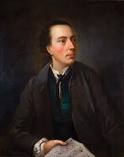The latest in Roz Southey's Charles Patterson series is now out. The books, set in and around Newcastle upon Tyne in the 1730s, are historical crime fiction with a supernatural twist. Roz says she didn’t set out to write a paranormal crime series - the idea just came to her as she was writing the first one. Now with each book Roz has to think of a mystery that will challenge her hero, and the reader, within the rules of the universe she has created.
Charles Patterson is an impoverished musician who also has a talent for investigating murder. The character is based on Charles Avison, a Newcastle man who was one of England’s most important composers in the eighteenth century. The flourishing music scene scene of north east England in that period plays a major role in the books, as does Newcastle itself, with its quayside, narrow alleys and elegant squares.
Newcastle was a fast growing town in the eighteenth and nineteenth centuries. Its prosperity was based first on the coal mining in the region, and the export of coal to London and elsewhere. A hundred years after Charles Patterson’s time, around a million and a half tons of coal a year were being shipped out of Newcastle.
As the Industrial Revolution gathered pace, a wide range of goods was manufactured in and around Newcastle. ‘Every description of goods in cast and wrought iron, and brass; steel goods; sheet and pipe lead; patent-shot; white, orange, and red lead; paint; crown, flint, and bottle glass; earthenware and pottery; alkali and other chemical preparations; copperas, soap, salt, and various other articles…. There are other foundries and forges for the manufacture of steam-engines, machinery of all descriptions, and agricultural implements; and extensive works for building railway and other carriages.’ Shipbuilding too was a major industry on the Tyne.
In 1827, the author of a history of Newcastle declared ‘The richer classes in Newcastle consist of the descendants of ancient and distinguished mercantile families, or of those who have accumulated a fortune by a long exercise of superior knowledge and industry. They are therefore well-informed, polite, and unostentatious; and to the influence of their manners may the respectful demeanour of the other classes be mainly attributed…. The insolent, vulgar, purse-proud upstarts, that swarm in some places, are almost unknown here.'
Charles Patterson would probably have disagreed.























